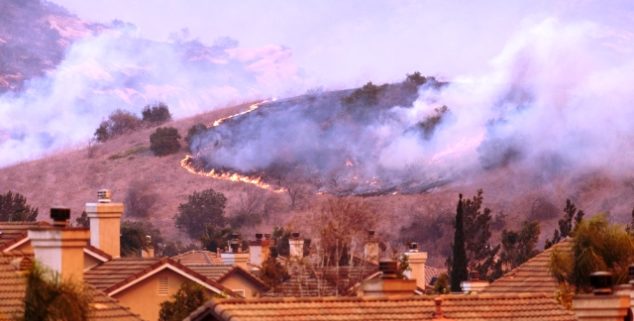Opinion
Wildfires, insurance: Avoid the quick fix
 The Canyon Fire 2 approaches Anaheim in October 2017. (Photo: Aarti Kalyani)
The Canyon Fire 2 approaches Anaheim in October 2017. (Photo: Aarti Kalyani)After a barrage of devastating wildfires raged across our state in recent months, it is time for all Californians to accept a sobering fact: this is the new normal. Several factors — including warmer and drier summers, and decades of fire suppression — have created a California that will be much more susceptible to wildfires in the future.
That’s the bad news. The good news is, if we can work together, we can ensure people get the education and assistance they need to safeguard themselves and their loved ones.
It’s tempting to try to regulate our way out of a difficult situation, but sometimes less is more.
But how do we take this next step? How do we learn from these disasters and create policies that will protect the California way of life, now and in the future?
Clearly, insurance is an integral part of the solution. Insurance companies have done what we always do to help communities ravaged by wildfire and other catastrophes — we’ve deployed catastrophe teams to affected areas, set up claims centers to help families meet their daily needs, supported local clean-up efforts and first responders, and donated hundreds of thousands of dollars to relief efforts. Insurers are on this journey to rebuild for the long haul and are committed to helping these communities recover and thrive.
Legislators are stepping up to help communities, too. However, as they seek to support California homeowners, lawmakers must resist the urge to jump to quick proposals that ultimately do more harm than good. Well intended legislation must also promote appropriate and sustainable public policy and a robust insurance marketplace for the benefit of consumers.
It’s tempting to try to regulate our way out of a difficult situation, but sometimes less is more. For instance, homeowners in one part of the state — who are already struggling with the affordable housing crisis and ever-increasing cost of living — should not be required to subsidize insurance costs for others. In the haste to protect consumers, caution should be taken to avoid creating more problems than we’re solving.
Legislatorsshould look at the bigger picture and address the causes of these issues in the first place.
For starters, they should pass policies that strengthen zoning laws to protect families that are rebuilding in high-risk zones. It is important to balance residents’ desires to live in these areas with the new reality that we’re all facing. Also, overgrowth in our forests was a key factor in several of these conflagrations, so policymakers should make sure our forests are being properly managed. Lastly, the state’s emergency response systems need to be supported and improved.
Some of the far-reaching bills lawmakers are considering could prohibit insurance companies from factoring in risk when setting the premiums for its customer base. This could lead to urban homeowners subsidizing homeowners who live in higher-risk areas hundreds of miles away.
Homeowners also have a role to play here, as well. They can’t look at insurance as a cure-all — they need to understandhow their policies work and maintain regular contact with their insurers. Insurance is a very valuable thing for a homeowner, but it’s not something that’s purchased once and forgotten.
Continual communication by the consumer with their insurer is key, and that should include an annual insurance check-up. Consumers need to make asimple yearly video of their home, house renovation, and new contents purchases. This can make a huge difference in the event of a wildfire.
Homeowners should also share contracting estimates with their insurance adjuster. In the difficult days after a devastating loss, it’s easy to be overwhelmed by all the numbers, forecasts, and decisions that must be made. But experienced insurers can work with customers to get past estimates and arrive at a workable bid.
The fires also remind us how important it is to thoughtfully consider decisions about insurance coverage amounts. Some homeowners purchase smaller policies with lower coverage amounts that don’t cover the entirety of rebuilding a home in exchange for easier-to-manage premiums. This tradeoff equals a smaller payoff in event of a disaster in return for cash in their pockets for retirement, college, and everyday life.
Our environment is changing, but California has a stable private market for fire insurance. We need to protect this solid market and address the issuesthatgot us here, rather than jeopardizing our stability with legislation that could harm the ability of homeowners to protect their homes.
—
Ed’s Note: Christian J. Rataj is senior regional vice president of the National Association of Mutual Insurance Companies, focusing on state government affairs in the western region.
Want to see more stories like this? Sign up for The Roundup, the free daily newsletter about California politics from the editors of Capitol Weekly. Stay up to date on the news you need to know.
Sign up below, then look for a confirmation email in your inbox.

Leave a Reply